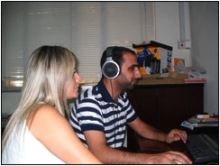It’s been almost two months since I took up the Knight Fellowship and six investigative journalism units in Egypt, Jordan and the West Bank are up and running.
Training for both broadcast and print journalists at several different media outlets has been completed, and investigations are underway in the areas of stock exchange corruption, road accidents and even business by some influential business men who are also prominent politicians.
In Jordan, Farah Al-Nas Radio has completed an investigation on child alcohol consumption in a Jordanian border region. The investigation will be on air shortly after a lawyer checks its legal aspects.

Two journalists with Farah Al-Nas Radio edit the child alcohol addiction story.
Two journalists with Farah Al-Nas Radio edit the child alcohol addiction story.
The Al-Arab Al-Yawm daily independent newspaper, owned by the deputy Jordanian Prime Minister Rajaei Lemasher, is taking some steps to challenge government offices that failed to comply with the freedom of information law.
And Radio Al-Balad is investigating why Jordanians who’ve gone on police record – for drunk-driving offenses, for example – cannot easily clear their names. In the West Bank town of Bethlehem where the MA’AN news agency is based, journalists received intense training and are determined to go all the way toward establishing the investigative genre despite the difficulties they face when it comes to freedom of movement and living under Israeli occupation. They are investigating the lack of regulations to hold doctors accountable for professional mistakes. Other stories will soon be underway.
Investigative journalism has always been an area where the Western media excel, having featured these reports consistently in newspapers, radio and television. But in the Arab world the genre has been absent. Since Egyptian journalists in the 1950’s were encouraged by the brothers Moustafa and Ali Amin -- founders of the Akhbar El-Youm publishing group -- to go undercover to reveal the social problems and unveil the dark worlds of beggars, burglars and drug barons. But since then, investigative journalism in the Arab World has been idle.
The reasons vary but it’s partly due to authoritarian rule and dictatorship. Journalists in general were afraid to speak freely. Censorship was imposed in the sixties and rulers used the Arab-Israeli military conflict to tell the citizens they had no time to do anything until the wars with the Israelis were won. Since the last big war between Arab armies and the Israelis in 1973, freedom of speech has taken steady steps, but for many that is not enough. Some Arab journalists still face trial if they step over the “red line,” which basically means criticizing the ruler.
Building on these steps, the International Center for Journalists (ICFJ) partnered with Arab Reporters for Investigative Journalism (ARIJ) in 2007 to revive investigative journalism in Egypt and introduce the genre to the rest of the Arab World. Al-Masy Al-Youm of Egypt jumped in showing great commitment. Through courses and practical journalism, some fine investigations have been done exposing problems in areas like health, the environment and other sectors in the lives of millions of Arabs.
That was only the first step.
Training and random investigations are not enough, decided the ICFJ & ARIJ. The Arab world is ready to go deeper and deeper to discover itself amid calls for democracy, political reform and better systems for accountability and transparency. And that’s why I became a Knight International Journalism Fellow. The task is to help six media organizations in the Arab World set up units of investigative journalists who eventually, through their investigations, hope to enlighten their target audiences in the areas of misconduct, corruption and mismanagement.